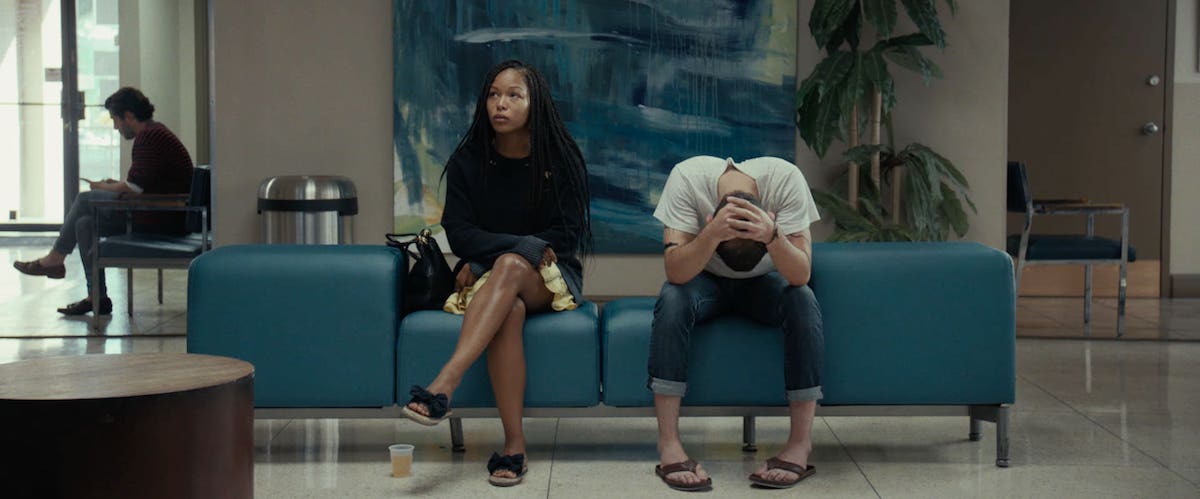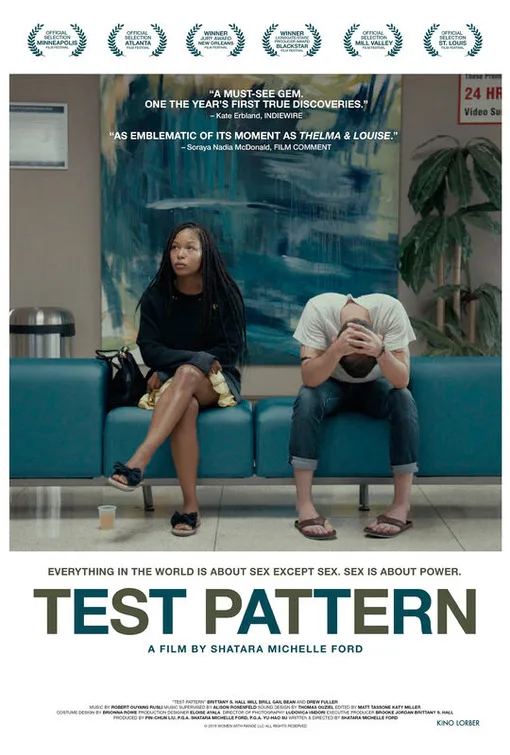Something is wrong with Renesha (Brittany S. Hall). An untouched glass of water is slipping between her relaxed hands. She doesn’t seem fully aware of the too-eager man caressing and kissing her. It’s an unnerving opening to Shatara Michelle Ford’s electric directorial debut “Test Pattern,” one that soon gives away to a flashback of happier times. A then-lively Renesha is out with friends at a bar when a young man emboldened by liquid courage steps up to ask for her number. He’s different from the first man seen in the movie—a little insecure, kind, and charming. Evan (Will Brill) is a tattoo artist and soon becomes a supportive partner to Renesha’s outgoing and ambitious career woman. Just after starting a new job, Renesha joins her friend Amber (Gail Bean) for a girl’s night out. Evan stays home. While the pair are out at a bar, two mysterious men approach them and claim they’re celebrating the sale of their company. Their insistence and Amber’s pleas push Renesha to stay, drink, and dance with them. Renesha’s world starts to spin, and then everything goes wrong.
“Test Pattern” shifts gears by the morning. Renesha is unceremoniously dropped off by her assailant and reunites with Evan at Amber’s place. Shocked by her state, he springs into action trying to get his girlfriend help. The couple stumbles into the movie’s central painful truth: there may be no justice after this harrowing experience. It’s a truth millions of victims of sexual assault live with. Many more never even attempt to navigate the frustrating process of reporting that our two characters face. Written and directed by Ford, the filmmaker navigates this thorny experience with patience and attention to detail, and resulting in a moving slow-burning drama filled with unspoken—but not unseen—hurt.
Much like Eliza Hittman’s “Never Rarely Sometimes Always,” access to women’s healthcare is sometimes a cruel, demoralizing labyrinth, full of deadends and frustrating setbacks. “Test Pattern” dramatizes these shortfalls throughout its story. There’s no facts or figures lobbed at the audience, just a human story anyone with a heart could sympathize with. For instance, rape kits that are so vital to criminal investigations can only be administered by a trained nurse and time is of the essence. This is dramatized by one frustrating visit to the hospital that lacks the trained personnel. Even though the hospital has utterly failed Renesha, she must accept the charges of being admitted, adding financial injury to insult. Then, it becomes a gripping race to the next hospital as time ticks away. It’s one of many ways our country’s healthcare system has failed yet another Black woman. The many difficulties facing this Renesha and Evan sound like a Kafkaesque bureaucratic nightmare, but it’s a situation that’s shamefully too real. And that’s without addressing the backlog of untested rape kits preventing women like Renesha any sense of closure.
In between scenes of medical roadblocks, Evan and Renesha’s relationship also begins to change. It’s a crisis they’ve never faced before. Her trauma is both invisible yet present, as seen when she flinches when he touches her knee. The memory of the assault, hazy as it may be, remains in her body. As a white man, Evan seems unaccustomed to being denied or facing this much difficulty in seeking care. He yells out of frustration, but Renesha—both tired and in pain—is quiet. At one point, she loses confidence in the system altogether and asks to go home. But Evan is persistent, finally calling the police, a move that really triggers Renesha and likely her feelings about how cops have failed Black women, a point Amber brings up earlier in the movie. Without directly addressing their racial differences as a duller script may have done, Ford works it into story flawlessly, trusting actors Hall and Brill to embody their characters’ unspoken tensions. Hall especially rises to the occasion, communicating to the audience every hurt her character is experiencing. There’s a moment when she just plops onto the ground defeated, and it feels like a surrender, but she soon picks up her guard to fight against Evan’s well-meaning but mismatched intentions. Coupled with the talents of cinematographer Ludovica Isidori and music by Rob Rusli, Ford’s “Test Pattern” is an engrossing human drama, one that examines the intersections and inequalities between race, gender, and healthcare in a poignant and powerful way.
Now playing in virtual cinemas.




















